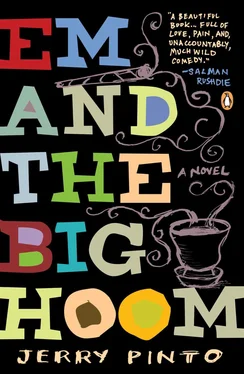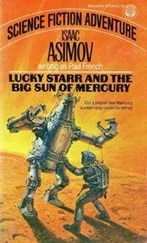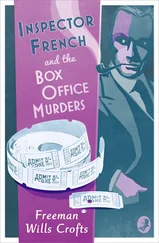Jerry Pinto - Em and the Big Hoom
Здесь есть возможность читать онлайн «Jerry Pinto - Em and the Big Hoom» весь текст электронной книги совершенно бесплатно (целиком полную версию без сокращений). В некоторых случаях можно слушать аудио, скачать через торрент в формате fb2 и присутствует краткое содержание. Год выпуска: 2014, Издательство: Penguin Books, Жанр: Современная проза, на английском языке. Описание произведения, (предисловие) а так же отзывы посетителей доступны на портале библиотеки ЛибКат.
- Название:Em and the Big Hoom
- Автор:
- Издательство:Penguin Books
- Жанр:
- Год:2014
- ISBN:нет данных
- Рейтинг книги:3 / 5. Голосов: 1
-
Избранное:Добавить в избранное
- Отзывы:
-
Ваша оценка:
- 60
- 1
- 2
- 3
- 4
- 5
Em and the Big Hoom: краткое содержание, описание и аннотация
Предлагаем к чтению аннотацию, описание, краткое содержание или предисловие (зависит от того, что написал сам автор книги «Em and the Big Hoom»). Если вы не нашли необходимую информацию о книге — напишите в комментариях, мы постараемся отыскать её.
Em and the Big Hoom — читать онлайн бесплатно полную книгу (весь текст) целиком
Ниже представлен текст книги, разбитый по страницам. Система сохранения места последней прочитанной страницы, позволяет с удобством читать онлайн бесплатно книгу «Em and the Big Hoom», без необходимости каждый раз заново искать на чём Вы остановились. Поставьте закладку, и сможете в любой момент перейти на страницу, на которой закончили чтение.
Интервал:
Закладка:
‘The last great mystery,’ she had called it, often.
‘If anyone should have some clues, it should be you,’ I had said, once.
She had chuckled.
‘If only that were so. But at least it holds no fears for me. Bring it on, I say.’
Here, then, it was.
The door was wide open when I got into the flat, light pouring out, the universal sign of death. Inside, all was noise and commotion. I ducked into the bedroom where Em lay on the bed with Susan sitting by her side. Silent, unmoving, there was something very wrong about her. Very wrong. I still don’t know how else to describe it. From my reading of crime novels, I knew all about the changes in the body after death, how the muscles let go, how the tension goes out of the body, the pooling of body fluids, the tiny explosions within each cell.
The Big Hoom came out and hugged me briefly. I could not remember this happening often. But she did not die often and things did not fall apart often. The centre did not stop holding often. Did it take death?
‘What happened?’
‘It was a heart attack,’ he said. I almost smiled. A heart attack? Those happened to other people. My mother could not have died of a heart attack.
Susan seemed to read my thoughts.
‘It’s true. He woke up and found her curled up beside him.’
I sat down beside her. I wanted to hug her but I couldn’t. We didn’t hug. Em did the hugging. She ambushed people with hugs and kisses. Potchie kisses she called them when she left a bit of saliva behind.
‘Odd,’ I said.
‘Not with a bang but not even a whimper.’
There had been both, bangs and whimpers. But she had left in silence, in sleep.
The world came back in. Other people, their voices, their curious faces, their odd movements. We were not used to other people. We went to see them; they did not come to see us. They did not want to see her and she was uneasy with them until she was comfortable. A stray comment could bring with it repercussions that could last for days. Where the visitor sat and what he said and what he did provided rich mulch in which strange fantasies, ribaldries, fears and scenarios could grow. Visitors were not encouraged. No, we didn’t have visitors. Now we could. Did we want them? Did we know what to do with them?
I could not believe that I was already…
‘Have you bathed?’ Susan asked.
I had not.
‘You should bathe,’ Susan said, a trace of elder-sister irritation showing at the edges of her concern. Was I concerned about her? I couldn’t tell. I didn’t seem to be feeling anything.
I went to shower. The water triggered tears and I wept. When I assumed I had finished, I washed my face again and waited. From time to time, I was startled by a sob rising in me. These did not seem to be linked to the pain I was feeling. They seemed organic, like marsh gas, like breathing.
What was this to be like? How were we to be? There were all kinds of questions to be dealt with and a host of people to deal with them. Did we have a nice dress? (Susan was choosing one.) Would I call the parish priest? (This had already been done.) Who had signed the death certificate? (Dr Saha had asked for someone to come to his house by nine o’clock.) And what kind of coffin would we like? (Like?)
There seemed to be many young men in the room. One of them returned with ice, a huge block of it.
‘Where shall I put this?’ he asked me, a hunter-gatherer triumphant at having returned with his kill.
‘He’s the son,’ hissed another young man. I did not recognize either one but they both seemed to feel they had the right to be there and to be helpful. It was the badge of their tribe.
‘Sorry, aahn?’ he said. Obviously the son of the deceased was not expected to be able to answer questions. He took the ice into the kitchen and began to divide it up into blocks.
A series of women came by and kissed me. Granny surfaced suddenly among them, her face tear-streaked and the women changed direction and began to kiss her.
‘Rose dress,’ said Granny. ‘Her rose dress. She thissing.’
Susan got up to find the dress in which Em had said she wanted to be buried. I sat down next to The Big Hoom.
‘I thought it would be me,’ he said. ‘I thought I would go first.’
‘I thought so too,’ I said. It seemed thoughtless but he didn’t seem hurt. I didn’t know why I had said such a thing. Perhaps it was only because men die first in Goan Roman Catholic families and their women don black and courage in equal measure and make pickles until their sons become bishops and can give sermons about them. He didn’t seem to be paying attention. The air was filling with the smell of lilies as wreaths began to come in. Who was sending these flowers? I couldn’t stand the smell of lilies.
‘I’m going to the undertaker,’ I said.
‘Only if your mind is quiet,’ he said.
My mind wasn’t, but I did remember that Em had declared that she would like to be buried as simply as possible. And that she had wanted to be useful. I went back into the house and intercepted Susan.
‘She wanted to donate her eyes.’
‘They came and went,’ she said.
They took her eyes? Yes, sure, that was what she wanted. I suddenly wanted to see her eyes but I knew that would no longer be possible. It would have to be memory now.
You have your mother’s eyes, I had been told often.
I began to cry again but I managed not to sob. You can cry in public as long as you do not sob. Tears are transparent. If you’re walking fast, if the sun’s too strong, no one notices. Sobs intrude. They push their way into people’s consciousness. They feel duty-bound to ask what has happened. I cried silently all the way to the undertaker.
Outside his storefront, the undertaker had a sign: ‘We can take your dead body, anywhere, anytime, anyplace.’ Visually, this was represented by an aeroplane with a coffin dangling from it. Later, the undertaker would become something of a minor celebrity for his signboards. ‘When you drop dead, drop in,’ one would say. The next one said, ‘Mr Smoker, you’re the next one to come coffin in.’ This was followed by ‘We’re the last to let you down.’ And then would come the strange ‘Grave problems resurrected here.’
But at the time, there was only a coffin dangling from a plane and three albums full of images of coffins. Some were white (‘For nuns, priests, and unmarried people,’ said the attendant), but most were wood-brown or purple. There was a bewildering variety of images, and a range of designs. The man kept up a steady litany, ‘… lace pillow with real silk, or you can have satin pillow, handmade fittings on the side, brass or you can go for this one which has silver, but first you want to decide what you want, teak or plain. But do you have a permanent grave?’
I had no idea but I was guessing we didn’t.
‘No good. Got to know.’
I called home. We didn’t.
‘Ah good. Sometimes problem like that comes. You done the booking?’
I had no idea what we were supposed to book.
‘You go tell the faaders. Or we can tell. But you made up your mind?’
When it became apparent that I did not want a slow-moving hearse or a teak coffin lined with real silk, the undertaker lost interest in the proceedings. He told me what I had to do and left me to do it.
At home, the women of the family had finished washing the body. They had dressed her up and put cheerful pink shoes on her feet.
A priest arrived, looking a bit bedraggled. He was served tea and began a rosary. Afterwards, he blessed the body and came and asked me if I wanted to speak. I had no idea what to say. I could have put the words together but then I had no idea whether I would be able to get through them. And I knew that if they were glib and born out of a need to impress, they would come back to haunt me. So we opted for a service that would in no way suggest how unique Em had been or how powerful a force she had been in our lives. The ordinary words would cloak her remains in the normal. There would be no reminders of who she was and how different her life had been or how strange our grief was.
Читать дальшеИнтервал:
Закладка:
Похожие книги на «Em and the Big Hoom»
Представляем Вашему вниманию похожие книги на «Em and the Big Hoom» списком для выбора. Мы отобрали схожую по названию и смыслу литературу в надежде предоставить читателям больше вариантов отыскать новые, интересные, ещё непрочитанные произведения.
Обсуждение, отзывы о книге «Em and the Big Hoom» и просто собственные мнения читателей. Оставьте ваши комментарии, напишите, что Вы думаете о произведении, его смысле или главных героях. Укажите что конкретно понравилось, а что нет, и почему Вы так считаете.











